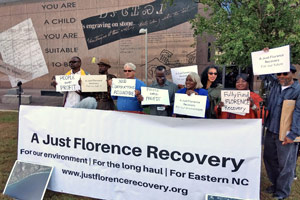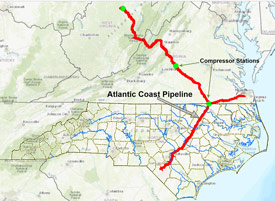Triangle Branch (NC) Speaks Out to Stop Environmental Devastation and Fracking
Published on November, 55 2018
Rally for Environmental Justice with Al Gore and Rev. William Barber held on August 13, 2018, at the Belews Creek Coal Ash Pond, Stokes County, NC.
By Lib Hutchby and John Wagner
Triangle Branch, North Carolina
Earth Democracy Issue Committee
The Triangle Branch (NC) is in alliance with over forty organizations speaking out to stop destruction of the state’s natural resources, educate citizens on several imminent crises, support preservation and conservation, and stop fracking. So far, Governor Roy Cooper has been unresponsive.
The organizations working together include: The NC Environmental Justice Network, the Rachael Carson Council, Appalachian Voices, Clean Water for NC, the Dogwood Alliance, Waterkeepers Alliance, APPL, BXE, WILPF-Triangle Branch, and many more. We are making every attempt to speak with Gov. Cooper about our concerns, but he has not replied to a single letter sent or hand-delivered, nor has he scheduled appointments requested.
Fossil fuels must be left in the ground. As Al Gore said recently in Greensboro, NC, “The stone age didn’t end because there were no more stones.” Humans, like foraging birds, will be left to find nourishment from oil-soaked soils, and our drinking water will have been used for fracking and in drilling mud, or it will be laced with chemicals for which we have not found treatment—unless we prevent this contamination, now!
 The state of North Carolina is literally in the grip of corporate money and influence. As you read on, you will see the ways this summary of what’s happening in NC is like so many other states where the energy corporations dominate and investors are making a profit at the expense of people and the planet. Here’s the state of affairs:
The state of North Carolina is literally in the grip of corporate money and influence. As you read on, you will see the ways this summary of what’s happening in NC is like so many other states where the energy corporations dominate and investors are making a profit at the expense of people and the planet. Here’s the state of affairs:
Eastern North Carolina: Flooding and Contamination
Flooding and contamination are prevalent In the eastern part of the state, where people were still recovering and slowly rebuilding from the impact of Hurricane Mathew’s severe flooding in 2016, compounded by the effects of the flooding of huge factory hog and poultry operations. Massive lagoons of hog waste flowed into yards, neighborhoods, drinking water sources, streams and rivers. This fall, in 2018, those same areas have again been flooded and impacted by contamination caused by Hurricanes Florence and Michael.
Several superfund sites are also located in these areas, with contamination from Dupont/Chemour’s persistent defluorinated compounds including GenX. The state is also facing the start of fracking as state agencies finalize their hopelessly weak fracking regulations.
Less well known, but extremely serious threats are from the Enviva Corporation and other wood pellet companies. These companies are clearcutting valuable bottomland hardwood forests, grinding them into wood pellets that are shipped overseas to become a false “green and sustainable” alternative to Europe’s coal-fired power plants. The effects of this clearcutting and burning of old-growth forests are worse for the global climate than the burning of coal!
Proposed Atlantic Coast Pipeline Is “a Con”
 The Atlantic Coast Pipeline (ACP) is proposed to carry fracked gas from West Virginia and the Marcellus shale, across Virgina and North Carolina. It will devastate the environment. Duke Energy has a monopoly as a utility. Third party solar installations are considered illegal, and, during the Obama administration, Duke Energy and Dominion partnered to invest in a 600-mile fracking gas pipeline called the Atlantic Coast Pipeline.
The Atlantic Coast Pipeline (ACP) is proposed to carry fracked gas from West Virginia and the Marcellus shale, across Virgina and North Carolina. It will devastate the environment. Duke Energy has a monopoly as a utility. Third party solar installations are considered illegal, and, during the Obama administration, Duke Energy and Dominion partnered to invest in a 600-mile fracking gas pipeline called the Atlantic Coast Pipeline.
The Triangle Branch of WILPF has worked for years to stop fracking and is now trying to prevent the Atlantic Coast Pipeline and the Mountain Valley Pipeline from cutting gashes across our state.
Robert Zullo’s article in the Virginia Mercury newspaper called it “The con at the heart of the Atlantic Coast Pipeline.” The ACP is posed to drill under the Blue Ridge Parkway and the route includes crossing the Appalachian Trail, flattening mountain ridges of old growth forest, crossing or going under rivers, creeks—over 300 bodies of water in NC alone. Preparations to drill under the Tar River are imminent. This river is the home of a federally endangered species of mussels found nowhere else on the planet.
“What you’re left with, in Virginia and in NC, for example, is a regulated utility using its captive customers to bear all the risk of a multi-billion-dollar boondoggle that the utility has never studied whether it needs it and the utility is going to make customers pay for it regardless of whether they ever use it,” said Will Cleveland, an attorney with the Southern Environmental Law Center.
Theresa "Red" Terry is known for the five-week tree-sit she and her daughter endured on her own land to protest the separate Mountain Valley Pipeline, which will be extended into North Carolina and renamed Southgate. Terry isn’t a lawyer but a resident who understands the implications for her home and her state. As she puts it, “Dominion is buying their own gas so they can have permission to rape our property; I would love to look at anyone else and say ‘I would love to make money. I’m taking it from you.’”
Creeks are also vital resources. They refresh larger waters that serve as the sources for human consumption and provide a home for a wide array of wildlife. For example, along Swift Creek’s upper stretches—designated an Outstanding Resource Water by the state —you can find 10 state and federally listed rare, threatened, and endangered species, part of a trove of more than 50 fish species, 16 freshwater mussel species, and seven crayfish species. Yet the low water flows of small rivers and streams leave them vulnerable to pollution. They don’t have a voice of their own, except the voices of those of us who take the time to know them, and to speak on their behalf.
All three compressor stations for the ACP have been located in areas that will result in extreme violations of environmental justice. North Carolina’s compressor in Northampton County is in a county that is 58 percent African American. The ACP ends in Robeson County next to the SC border. This county has the most racially diverse population in the state, and has the largest population of indigenous people east of the Mississippi. The pipeline’s terminus is right in the center of the homeland of the Lumbee Tribe. However, the final environmental impact statement from the Federal Energy Regulatory Commission (FERC) ignored the severe impacts to communities of color and indigenous populations along the pipeline and concluded that “no disproportionate impacts will result from the pipeline.”
The Triangle Branch of WILPF has worked for years to stop fracking and we are now trying to prevent the Atlantic Coast Pipeline and the Mountain Valley Pipeline from cutting gashes across our state. As you read this, hundreds of miles of trees through West Virginia, Virginia, and North Carolina have been cleared. Now, tree-cutting is resuming and preparations to drill under the Blue Ridge Parkway, the Appalachian Trail, and the Tar River in NC are about to begin.
Landowners are fighting, but they are having their lands seized by eminent domain.
Marches, rallies, calls, letters, and meetings with the NC Department of Environmental Quality with the Governor’s staff must have fallen on deaf ears. Economic analysis proving the pipeline to be unnecessary have been ignored. Neither the ICPP, nor the devastating effects of recent hurricanes accelerated by the Climate Crisis, have changed the minds of the North Carolina Governor, who could stop the ACP construction tomorrow. There are court cases that challenge various aspects of the ACP, but at this point, all construction can proceed while the cases are brought to trial.
WATER is still LIFE and we still require CLEAN AIR for breath.
We persist!! Thank you for your support as we go forward, no turning back, standing strong for justice for the Earth.



